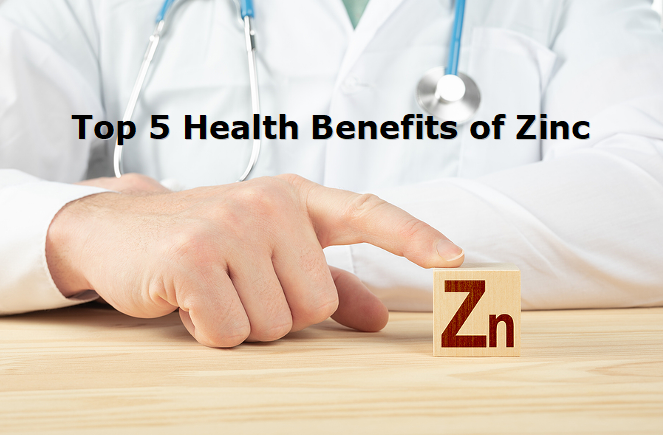Zinc is a key mineral for optimal health. Because of this we want to look at the health benefits of zinc.
This mineral is needed for proper immune function, wound healing, bone health, metabolism, and DNA synthesis.
(If you would prefer to view this information in a video format, then please click on my YouTube video below:)
Because your body can’t produce or store it, zinc is considered an essential nutrient. This means you need a daily consumption of it through either diet or supplementation.
The normal RDI is 11 mg for men and 8 mg for women.
Because zinc is present in every cell, it’s the second most abundant trace mineral in your body. Needed for over 300 different enzymatic reactions, zinc helps with the following:
-
The production of more than 90,000 enzymes.
-
Repairs and strengthens proteins, especially hemoglobin.
-
Helps with digestion and absorption of calcium.
-
Responsible for transporting amino acids and magnesium through the cell membranes.
-
Important for proper blood flow and growth of new red blood cells.
-
Essential for healthy skin, hair, and nails.
-
Helps the body absorb magnesium, vitamin A, vitamin E, and vitamins B2 and B12.
-
And Zinc is a powerful antioxidant, which gives it anti-inflammatory properties.
That’s just a small sampling of the health benefits of zinc. Which brings us to the 5 key benefits.
First is Immune Function. As we have learned in the CoVid19 pandemic, everyone needs a strong and vibrant immune system. Zinc plays a critical role in strengthening your immune system.
Zinc is necessary for both immune cell function and cell signaling. Zinc helps to stimulate the production of key immune cells such as T-cells and natural killer cells.
Zinc has a long history of helping to reduce cold and flu symptoms, especially when taken at the beginning of the illness. Because of this, zinc has been used with other treatment protocols for the CoVid19 virus. Here is a link to one such study:
https://www.webmd.com/lung/news/20200923/could-zinc-help-fight-covid-19
Wound Healing is next on our list of health benefits of zinc.
Hospitals use zinc as part of their treatment for burns, skin ulcers and other skin injuries. And the reason why is that zinc is needed for collagen synthesis, immune function, and proper inflammatory response to aid in the healing process.
This is especially important to diabetics who have foot ulcers. In a 12 week study of 60 participants, those treated with 200 mg of zinc per day had a significant reduction in ulcer size when compared to the placebo group.
When it comes to healthy bones most people think of calcium and vitamin D. Some will add magnesium and vitamin K2. But a lot of people overlook the importance of zinc.
Zinc is a building block for bone.
It prevents the breakdown of bone. And it helps to form new bone. This becomes extremely important for older adults who are lacking in their zinc intake. A zinc deficiency may contribute to osteoporosis and fractures.
Some research suggests that a daily intake of 25 to 50 mg of zinc would help to offset this disease process in older adults.
Zinc plays a huge role in your metabolism. Because of this we can only touch the surface. The very act of breathing has a zinc component. It’s essential to the elimination of carbon dioxide.
Zinc is a cofactor that is needed to synthesize insulin and growth hormone. The intake of zinc can help keep your red blood cells healthy. Zinc plays an important role in blood clotting. It also helps regulate iron metabolism and metabolism of fatty acids.
But of all the health benefits of zinc, this one is the most important. Zinc is needed for all DNA and RNA replication. Because of this zinc is required for the proper genetic make-up and reproduction of every cell in your body. Zinc helps to prevent abnormal cell growth that can lead to various forms of cancer.
Given today’s eating patterns, most people do not get adequate intake of zinc. Because of this many foods are fortified with synthetic forms of zinc. The easiest way to make sure you’re consuming enough zinc per day is to use a zinc supplement. Here are the following forms:
-
Zinc Gluconate
-
Zinc Acetate
-
Zinc Sulfate
-
Zinc Picolinate
-
Zinc Orotate
-
Zinc Citrate
Of these 6 forms, the most common is either Zinc Gluconate or Zinc Citrate.
I would suggest looking at the nutrition labels of the food you’re eating to see how much zinc you consume per day. Given all the health benefits of zinc you want to make sure you’re consuming enough of the key trace mineral.
If you want to drive deeper into this topic, then here are some excellent links for additional information:
https://www.getroman.com/health-guide/zinc-supplement/
https://www.healthline.com/nutrition/zinc#bottom-line
https://www.lifeextension.com/magazine/2021/4/zinc-bone-health
https://jamanetwork.com/journals/jama/article-abstract/318838
https://flipper.diff.org/app/pathways/3503
Blessing Lives Through Nitric Oxide Therapy!
Dan Hammer

Leave a Reply
You must be logged in to post a comment.